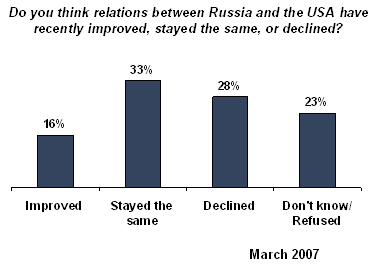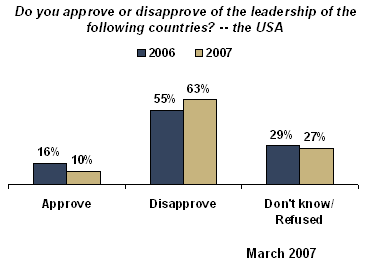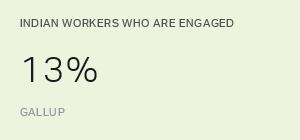GALLUP NEWS SERVICE
PRINCETON, NJ -- The Group of Eight summit in Heiligendamm, Germany concluded this past weekend with tensions still high between the United States and Russia over a proposed U.S. missile defense system in Eastern Europe. On his way back to the United States, President George W. Bush made a stopover in Albania, where he expressed impatience with Russia's opposition to independence for Kosovo, the breakaway Serbian province that consists predominantly of ethnic Albanians. The issue has further fueled speculation that U.S./Russia relations could eventually degenerate into a new Cold War.
The wariness between Bush and Russian President Vladimir Putin is reflected to some extent in the opinions of their constituents. Americans' opinion of Russia has been declining at the same time that Russians' opinion of American leadership -- and of relations between the two countries -- has diminished. According to the latest Gallup World Poll survey of Russia, conducted in March of 2007, more Russians think relations between the two countries have declined over the past year than say relations have improved -- 28% vs. 16%, respectively.

Furthermore, almost two in three Russians -- 63% -- say they disapprove of American leadership, up from 55% in 2006.

For their part, Americans have grown somewhat less likely to say they have a favorable opinion of Russia over the last two years. In February, just over half of Americans (53%) said they had a "very favorable" or "mostly favorable" opinion of Russia, down from 58% last year and 61% in 2004. It remains to be seen whether Americans' opinions of Russia have declined even further given the recent tensions between the two countries.
Survey Methods
Results for Russia are based on interviews conducted in March 2007 with a randomly selected national sample of 1,475 residents, aged 15 and older. For results based on this sample, one can say with 95% confidence that the maximum margin of error attributable to sampling and other random effects is ±3 percentage points.
Results for the United States are based on interviews conducted in February 2007 with a randomly selected national sample of 1,000 residents, aged 18 and older. For results based on this sample, one can say with 95% confidence that the maximum margin of error attributable to sampling and other random effects is ±3 percentage points.
In addition to sampling error, question wording and practical difficulties in conducting surveys can introduce error or bias into the findings of public opinion polls.